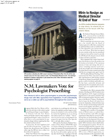Both Democrats and Republicans are eager to pass Medicare reforms this year, according to congressional aides at a January health policy conference on Capitol Hill. APA’s priorities include correcting the negative payment problem and obtaining regulatory relief and parity.
Physicians who participate in Medicare have a lot to be unhappy about. Reimbursement rates are lower in general than those of private insurance, the paperwork is endless, and Medicare audits rival those of the IRS.
The straw that nearly broke the camel’s back, however, was the 5 percent reduction in physician payment this year due to a faulty Medicare payment formula (see
facing page).
The angry response from physicians’ groups last fall got the attention of Congress. Two-thirds of the Senate and more than half of the House had endorsed the APA-backed Medicare Physician Payment Fairness Act by early February. The bills in the House and Senate are designed to fix the payment-update formula and prevent further reductions, according to Nicholas Meyers, deputy director for congressional relations in the APA Division of Government Relations.
Another piece of legislation that would reduce the strain on physicians who participate in Medicare was passed by the House unanimously last year but wasn’t picked up by the Senate. The Medicare Regulatory and Contracting Reform Act would limit the number of regulations issued, ease physician paperwork, and give Medicare administrators greater contracting flexibility (Psychiatric News, January 4).
Getting a companion bill through the Senate is another APA priority this year, said Meyers.
Health and Human Services Secretary Tommy Thompson announced last December that he had appointed a new advisory committee on regulatory reform. Several physicians are on the committee, which is charged with advising and recommending reforms to HHS for streamlining the regulatory process, according to an HHS press release. “It is important that doctors spend more time with patients and less time on paperwork,” said Thompson.
Another priority for APA is ensuring that Medicare beneficiaries have nondiscriminatory coverage for outpatient psychiatric services, said Meyers. Bills repealing the 50 percent copayment for outpatient psychiatric services were introduced in the House and Senate last year.
Prescription Drug Coverage
Democrats in the Senate and House are looking to curb soaring prices for pharmaceuticals so that all Medicare recipients can obtain drug coverage, according to the February 4 Congressional Daily Monitor. Sen. John Rockefeller (D-W.Va.), chair of the Finance Committee’s Health Subcommittee, is developing legislation that would encourage greater use of lower-cost generic drugs as part of any Medicare drug benefit. He may also seek to regulate pharmaceutical-industry advertising and sales practices, according to the Daily Monitor.
“As we return to a seniors’ prescription drug coverage plan in the context of an overhaul of Medicare, which the president has proposed in his budget (see story on
page 6), we must in a coordinated fashion, with the House Energy and Commerce Committee, examine how we regulate the delivery and marketing of drugs in this country,” said House Ways and Means Committee Chair Bill Thomas (R-Calif.), according to the
Daily Monitor.APA’s goal in any prescription drug benefit is to ensure that psychotropic drugs are covered at the same rate as other types of drugs, according to Meyers.
Parity and Patient Protection
After parity was defeated by House Republican conferees last December, the key House conference committee leader directed the chairs of the House Ways and Means, Education and Workforce, and Energy and Commerce committees to address parity this year.
Last year’s ill-fated patient-protection legislation required HMOs to abide by decisions made by independent medical review boards. The legislation stalled over controversial caps on the HMOs’ liability if sued.
APA has met with several key House staff to discuss hearings and legislative action, said Meyers.
Congress may be under pressure this year to enact patient-protection legislation if the U.S. Supreme Court rules in favor of an HMO and overturns an Illinois patient-protection law mandating independent appeals reviews. The high court is expected to decide the case, Rush Prudential HMO Inc. v Deborah Moran, this spring. The outcome will determine the fate of similar laws or regulations in 42 states and the District of Columbia, according to APA’s Division of Government Relations. APA had contributed to the cost of an amicus brief prepared by the AMA for this case.
Deborah Moran of Illinois filed a lawsuit in 1996 against Rush Prudential HMO Inc. alleging that the HMO violated the state external review law when it refused to pay for her shoulder surgery deemed medically necessary by an independent physician reviewer, according to a transcript of the case.
A federal court sided with the HMO stating that the state law was preempted by the 1974 Employee Retirement Income Security Act (ERISA). The U.S. Court of Appeals for the 7th Circuit agreed with Moran, and the HMO appealed the case to the high court.
The HMO’s attorney, John Roberts, based his argument on a case involving Pilot Life insurance 15 years ago in which the high court held that ERISA has exclusive remedies for disputes of benefit claims for plans it regulates, according to the transcript.
“The Illinois independent external review law at issue in this case affords a different remedy for a beneficiary dissatisfied with an HMO’s denial of benefits and should be reversed,” said Roberts.
Moran’s attorney, Daniel Albers, argued in response that the state law doesn’t conflict with ERISA or the court’s decision in Pilot Life, because “the statute is an insurance law, which states can regulate by leaving medical necessity decisions up to physicians who should be making them,” said Albers. ▪
